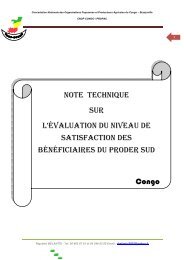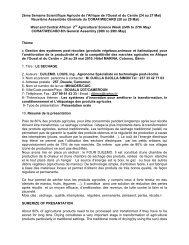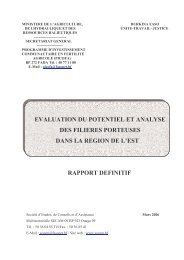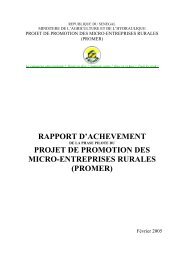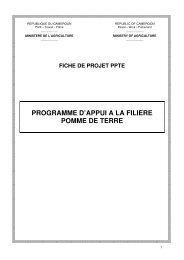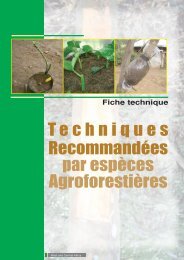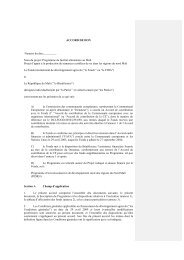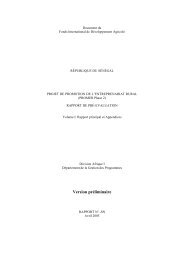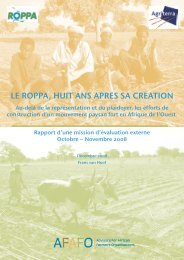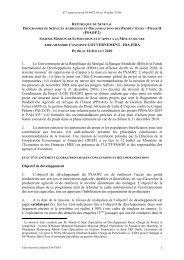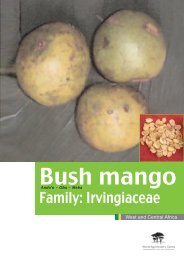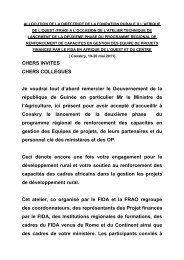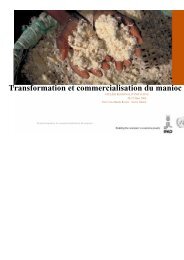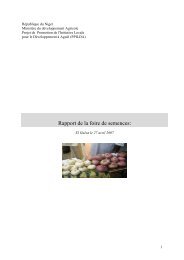Scaling Up the Fight Against Rural Poverty - FIDAfrique
Scaling Up the Fight Against Rural Poverty - FIDAfrique
Scaling Up the Fight Against Rural Poverty - FIDAfrique
You also want an ePaper? Increase the reach of your titles
YUMPU automatically turns print PDFs into web optimized ePapers that Google loves.
in Nigeria and <strong>the</strong> lack of a systematic process to foster innovation and scaling up as significant factors<br />
constraining IFAD’s ability to scale up 15 .<br />
The Sudan CPE also was published in September 2009. It refers to scaling up, but only in passing by<br />
stating: “The COSOP was unclear on how innovative solutions to rural poverty reduction were<br />
expected to be replicated or up-scaled.” 16 The report points to insufficient engagement on policy<br />
dialogue and knowledge management and to poor sustainability of projects. 17 However, <strong>the</strong> report cites<br />
some, albeit limited examples of successful scaling up.<br />
C. <strong>Scaling</strong> up in a <strong>the</strong>matic context<br />
We looked at IFAD’s scaling up experience in two <strong>the</strong>matic areas: environment and natural resource<br />
management (ENRM), and value chains. In <strong>the</strong> former area we benefitted from an internal in-depth<br />
review of IFAD’s response to climate change. In <strong>the</strong> latter area, we pieced toge<strong>the</strong>r various items of<br />
information about <strong>the</strong> experience to date with scaling up in what is a relatively new area of IFAD’s<br />
engagement.<br />
1. <strong>Scaling</strong> up in <strong>the</strong> area of environment and natural resource management<br />
A recently completed internal review provides a thorough overview of approaches and programs that<br />
IFAD has supported in recent years in <strong>the</strong> areas of ENRM, with a special focus on how <strong>the</strong>y relate to<br />
<strong>the</strong> new challenge of climate change.<br />
The report starts with a clear statement of <strong>the</strong> scale of <strong>the</strong> potential threat to human livelihoods created<br />
by climate change and lays out <strong>the</strong> contribution of agriculture and forestry to climate change, citing<br />
World Bank estimates that agriculture and deforestation account for 26 to 35 per cent of greenhouse<br />
gas emissions. However, as <strong>the</strong> report stresses, agriculture and forestry can play a key role in tackling<br />
climate change. The report goes on to review how IFAD’s interventions have supported climate<br />
change adaptation and mitigation, with a principal focus on ENRM. The report assesses technological<br />
solutions in <strong>the</strong> ENRM areas of agroforestry, community based natural resource management, water<br />
management and irrigation, coastal management and fisheries, and land tenure. It cites examples where<br />
IFAD’s interventions have been scaled up, and draws concludes that IFAD grants for climate change<br />
adaptation hold great potential for scaling up.<br />
Notable among <strong>the</strong> examples of successful scaling up by IFAD in <strong>the</strong> area of ERNM is <strong>the</strong> case of<br />
reforestation for <strong>the</strong> purpose of developing sustainable long-term land use practices in arid or semiarid<br />
areas for improved livelihood of poor farmers and for carbon sequestration. The “re-greening”<br />
initiative in <strong>the</strong> Sahel and o<strong>the</strong>r drylands of Africa is particularly relevant. This approach involves onfarm<br />
and off-farm forestry development and has a successful track record in selected Sahelian<br />
countries, especially in Niger, where “re-greening” has benefited about 5 million hectares with<br />
considerable economic and social benefits to poor farmers (IFAD 2010a). Some of this experience can<br />
be credited to <strong>the</strong> long-term engagement of IFAD in <strong>the</strong> 1980s and 1990s with soil and water<br />
conservation programs in Africa, especially in connection with its investments in replicable waterharvesting<br />
techniques.<br />
15 Corrective measures initiated in response to <strong>the</strong> CPE include <strong>the</strong> recent opening of a country office in Nigeria<br />
and some references to scaling up in <strong>the</strong> 2010-2014 Nigeria COSOP.<br />
16 IFAD Office of Evaluation (2009c), p. xvi.<br />
17 Ibid., p. xvii-xviii.<br />
23



